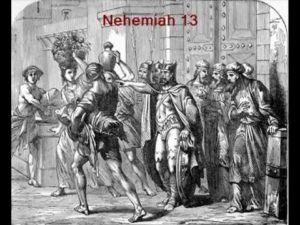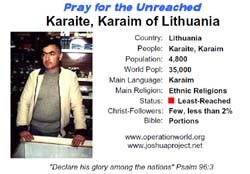TODAY’S READING FROM THE OLD TESTAMENT- NEHEMIAH 12:27-13:31
Chapter 12 verses 27 through 47 record the joyous dedication of the wall. It was a musical spectacle. Two great choirs paraded on the walls. One went to the right, with trumpets and a variety of other musical instruments. Nehemiah joined the procession that went to the left. Both choirs circled the city with leaders following them. They arrived at the temple.
Nehemiah 12:45 45 For they performed the worship of their God and the service of purification, together with the singers and the gatekeepers in accordance with the command of David and of his son Solomon.
Nehemiah 12:43 43 and on that day they offered great sacrifices and rejoiced because God had given them great joy, even the women and children rejoiced, so that the joy of Jerusalem was heard from afar.
On this day, there was also the public reading of Scripture (Nehemiah 13:1).
When we hear a message from God’s Word, we need to ask the question: “What am I to do about it?”
When they heard Deuteronomy 23:3-5, they realized there had been slippage in their worship practices. Although there had been previous reforms (Nehemiah 9:2, 10:28) there were still those who were accommodating the worship of the Ammonites.
Nehemiah remained a subject and employee of King Artaxerxes during all this time and returns to the King’s court in Babylon. 12 years later he once again asks for permission to return to Jerusalem (Nehemiah 13:6).
When Nehemiah returns to Jerusalem, he once again shows himself to be a strong leader with courageous conviction. He discovers four abuses and confronts the abusers directly.
- Eliashib, the high priest, had welcomed and offered permanent accommodation in a room in the temple for Tobiah, the man who had done so much to hinder the rebuilding of the wall. Nehemiah rightly discerned that Tobiah continued to undermine God’s work and his presence in the temple should not be tolerated. He personally threw Tobiah and his furniture out of the room. He then orders that the room be thoroughly cleaned and the temple belongings returned to their rightful place!

- Nehemiah discovered that the Levites were not being adequately supported by the tithes of the people, and they had to take outside jobs rather than fulfill their full-time responsibilities in the service of the Temple. The priests and singers had returned to their fields outside the city. Nehemiah restored the singers, priests and Levites back to their posts, and exhorted the people of Judah to fulfill their promised commitment to provide tithes to the support the work of the Lord.
- The Sabbath was not being honored and people were carrying on with their work on the seventh day. Foreigners were coming into the city to offer their wares and profaning the Sabbath. Nehemiah orders that the city be closed for business on the Sabbath day. He appointed supervisors to be stationed at the gates to ensure this order was carried out. Nehemiah petitions the Lord to aid him and remember him in this important work.
- Once again, Nehemiah must confront the Jewish men for marrying women from heathen nations and raising their children in the ways and language of their mothers. None of the children could even speak the language of Judah! Nehemiah confronts the offenders and gets physical (Nehemiah 13:25). He rebukes them for repeating the error of King Solomon (v. 26-27). One of the high priest’s sons married the daughter of Sanballat and defiled the priesthood.

The Book of Nehemiah concludes with Nehemiah praying that the Lord will remember that he did what he could (See Mark 14:8).
Nehemiah 13:30-31 30 Thus I purified them from everything foreign and appointed duties for the priests and the Levites, each in his task, 31 and I arranged for the supply of wood at appointed times and for the first fruits. Remember me, O my God, for good.
TODAY’S READING FROM THE NEW TESTAMENT – 1 CORINTHIANS 11:3-16
The Christian church was the only section of society in the Roman Empire that welcomed people of every social strata–male, female, bond, free, Jew, Gentile, rich and poor. The gospel brought freedom and hope to women, children and slaves.
Some carried this freedom to excess. Paul recognized that this was happening, especially with the women in the church at Corinth. They were stating their independence from men in a way that undermined the expression of God’s design for interdependence.
Paul clarifies that there is a prescribed order of male headship in creation. This order is to be reflected in the home and in the church.
Submission is not surrender, withdrawal, or apathy. It is not mindless acquiescence. God did not make the male as superior to the woman. But as he was made first, he is to be considered the head, or the source. As the Trinity share equal status, dignity, and privileges in a community of oneness, so also do men and women in Christ. The roles and persons of the Father, Son and Holy Spirit differ. So do the role and persons of the husband and wife. The woman draws her existence from the man, and therefore is placed alongside the man and derives the full value of the man.
Jesus is co-equal with the Father and the Holy Spirit, but He willingly put Himself in submission to them both in order to fulfill His mission. The same is true in marriage and in the church.
God’s pattern of headship is never to accommodate ‘lording it over’ or ‘bossiness’. By divine design, mankind is made in God’s image- male and female. The relationship of husband to wife and wife to husband is to represent the mutual respect that each member of the Trinity has for each other. In functional terms, in Genesis 2 we see that the woman has her origin in the man, and yet since then, every man is born of a woman. Paul highlights this balance in verse 12.
1 Corinthians 11:12 12 For as the woman originates from the man, so also the man has his birth through the woman; and all things originate from God.
Paul describes how this truth can be exhibited in the cultural context of his day. In Jewish law, if a woman were proved guilty of adultery, she would have her head uncovered (Numbers 5:11), probably meaning her hair cut off. In Corinth, a woman who had short hair or who flaunted her uncovered loose hair, was giving a signal to the general public that she had no husband and was a prostitute. For a Christian woman to flaunt her genuine liberty by cutting her hair or appearing without a head covering would be misrepresenting the gospel in the eyes of her non-Christian neighbors. More than that, it would be giving observing angels an indication that she was misunderstanding a divine truth. The angels know well the tactics of the devil to usurp God-given authority.
TODAY’S READING FROM THE BOOK OF PSALMS- PSALMS 35:1-16
This is a psalm of David written as he is being relentlessly pursued by King Saul and his men. He appeals to the Lord to be His defender, His sword, His shield, His deliverer, His help and His way of escape. He asks the Lord to counsel his fears:
Psalm 35:3b Say to my soul, “I am your salvation.”
We sense that David is asking for some emotional reinforcement for his faith convictions.
He appeals to the angel of the Lord that led Joshua into the battle of Jericho to take charge of his battle with Saul.
David’s words in verse 7 foreshadow the sufferings of Christ at the hands of men. They hated Him without a cause (John 15:25).
Psalm 35:7 7 For without cause they hid their net for me; Without cause they dug a pit for my soul.
David anticipates God answering his prayer for deliverance from his enemies, and resolves that his soul will rejoice in the Lord and give Him worship (v. 9-10, 18).
He humbly admits his struggle when God delays answers to his prayer and his enemies continue to taunt him. He asks, “How long, Lord?” (v.17)
TODAY’S READING FROM THE BOOK OF PROVERBS- PROVERBS 21:17-18
Proverbs 21:17-18 17 He who loves pleasure will become a poor man; He who loves wine and oil will not become rich. 18 The wicked is a ransom for the righteous, And the treacherous is in the place of the upright.
PRAY FOR THE NATIONS-
Lithuania
Republic of Lithuania
Europe
Geography
Area: 65,301 sq. km
The southernmost of the three Baltic states. Flat, arable land with many forests and lakes.
Population: 3,255,324 Annual Growth: -0.96%
Capital: Vilnius
Urbanites: 67.2%
HDI Rank: 46 of 182 (UN Human Development Reports 2009)
Peoples
Peoples: 24 (29% unreached) All peoples
Unreached Peoples Prayer Card
Official language: Lithuanian Languages: 12 All languages
Religion
Largest Religion: Christian
|
Religion |
|
Pop % |
Ann Gr |
|
2,778,745 |
85.36 |
-1.1 |
|
|
35,894 |
1.1 |
2.7 |
Challenges for Prayer
Catholicism retains a crucial role in Lithuanian society, but has not fully emerged from old ways of thinking to embrace its potential for godly influence in society. Pray that the Catholic Church uses its significant influence to draw people to Christ. Only one-sixth of Catholics attend church weekly. Fellowship with and acceptance of other Christian groups must be improved. Several Franciscan, charismatic and evangelical-style networks in the Church bring young leadership, new thinking and fresh spirituality; pray for their further growth.
The other confessions of Christianity also face many challenges:
- a) Traditional groups (Lutheran, Reformed and Orthodox) are struggling just to maintain their numbers, as are most denominations. The Orthodox are almost exclusively ethnic Russians; other traditional groups are mostly Lithuanian. Lutherans desire to see their Pietistic heritage renewed. Pray for new life in these historic groups.
- b) Baptists, Pentecostals and Adventists, the more established of the evangelicals in Lithuania, have struggles of their own. Retained traditions, which saw them through the Soviet era, must be balanced with the spiritual and organizational needs of a new era. Pray for new spiritual impetus for these faithful groups.
- c) Newer Pentecostal and charismatic churches grew quickly in the last decade through dynamic spirituality combined with active outreach and ministry. Growth looks set to continue; but against this backdrop, quality discipleship of new believers is key. Pray also for these churches to become genuinely indigenous, not just carbon copies of popular Western expressions of the Church.
- d) All believers. Some low-level prejudice against new religious groups exists, and there is still a widespread perception that evangelicals are a sect. Leaders and congregations must gain a greater understanding of their own evangelical faith before they can assert it in a broader context. The rapid growth of the early ’90s has passed, and pastors are kept busy with pastoral responsibilities. Pray for God to raise up those gifted in evangelism.
- e) Evangelical unity. There is still no Evangelical Alliance in Lithuania. Increased cooperation and demonstrable unity are essential if evangelicals are to have a greater impact on the nation.
PRAYER: Father, help us to be true to Your Word and to offer correction to our brothers and sisters when needed, in a humble-hearted way. Teach us to exercise our privileges in prayer and praise. We cast all our cares upon You knowing You care for us. Thank You for giving us such a perfect example of selfless concern and humble submission in the Person of Your Son. May Your glory be reflected in the church and in our marriages in such a way that those who observe us will know that we serve our Living Head. In His Name, we ask it!
